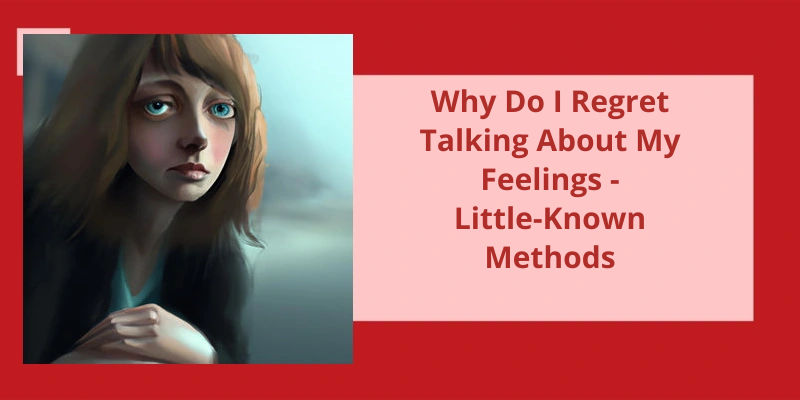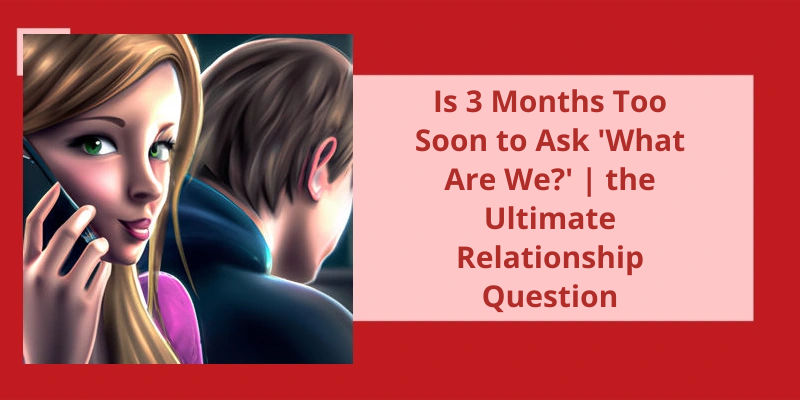Why do I regret talking about my feelings? This seemingly simple question may have deeper roots in our human nature and the complexities of interpersonal communication. We live in a society that often values emotional openness and vulnerability, encouraging individuals to share their feelings in order to foster deeper connections and promote self-awareness. However, despite the cultural encouragement, many people experience remorse or regret after disclosing their feelings to others. This phenomenon can be attributed to various factors, such as fear of rejection, potential judgment, or even the realization that our feelings may not be fully understood or reciprocated. The little-known methods explored in this blog aim to shed light on the reasons behind this regret and provide practical strategies to navigate the intricacies of discussing our emotions, ultimately enabling individuals to foster healthier relationships and personal growth.
Why Do I Regret Sharing My Feelings?
Why do I regret sharing my feelings? There are several potential reasons why you might feel regret after opening up about your emotions. One common reason is the fear of judgment or rejection. Sharing personal feelings can make you vulnerable, and if you perceive that the person you confided in doesn’t react positively, it can lead to regret. The fear of being seen as weak or overly emotional may also contribute to this regret, especially if societal norms or past experiences have conditioned you to believe that exposing your emotions is a sign of weakness.
If your listener didnt provide the understanding or empathy you anticipated, it can leave you feeling disappointed, invalidated, or even regretful for opening up. This is particularly true if you were seeking validation or reassurance about your feelings and didn’t receive it. Feeling misunderstood or dismissed can intensify the regret and make you question your decision to share in the first place.
Moreover, personal expectations can play a role in post-disclosure regret. If you’d high expectations for how sharing your feelings would make you feel or improve your situation, and those expectations werent met, it can lead to regret. Unrealistic or unmet expectations can leave you disappointed and questioning whether sharing your feelings was the right decision.
It’s important to remember that everyones experiences and reactions are unique, and what may lead to regret for one person might be empowering for another.
Strategies for Managing Vulnerability and Fear of Judgment When Sharing Emotions
- Practice self-reflection and understanding
- Cultivate self-compassion and acceptance
- Identify and challenge negative thought patterns
- Develop a support system of trusted individuals
- Seek professional help if needed
- Engage in activities that promote emotional well-being
- Set clear boundaries and communicate them effectively
- Practice mindfulness and grounding techniques
- Journal or engage in creative outlets for emotional expression
- Build resilience through self-care practices
Cynthia Johnson, a psychologist, explains that living with regret can have significant impacts on mental well-being. One of the most prominent effects is an increase in anxiety, as studies have shown that regret can contribute to a feeling of being stuck and an inability to move forward. This constant fixation on what could have been can also lower self-esteem and confidence, further exacerbating the negative emotional impact of regret.
Is Regret a Symptom of Anxiety?
Regret is often linked to anxiety and can be seen as a symptom of it. When we constantly ruminate about past decisions and choices, it can create a cycle of negative thoughts and feelings that contribute to overall anxiety levels. This can lead to a heightened sense of worry and unease, impacting our daily lives and overall well-being.
Living with regret can have a profound impact on our mental health. It isn’t uncommon for individuals to experience symptoms of depression due to the overwhelming feelings of sadness and disappointment that often accompany regret. When we dwell on our past mistakes or missed opportunities, it can be difficult to find joy in the present and look forward to the future. This can lead to a decrease in life satisfaction and a downward spiral into depressive feelings.
When we constantly question our past choices and dwell on the what-ifs, it can undermine our sense of self-worth and belief in our abilities. We may start to doubt our decision-making skills and feel inadequate compared to others who seem to have made better choices. This can lead to a decrease in confidence and a reluctance to take risks or pursue new opportunities.
It can also lower self-esteem and confidence, making it difficult to move forward and embrace new experiences. It’s important to address and process feelings of regret in a healthy way, seeking support from loved ones or professionals if needed, in order to prevent these negative impacts from persisting.
Source: Living with Regret: 5 Tips to Cope | Psych Central
It’s a common human experience to have moments of regret after saying something. Whether it’s a harmless slip-up or a more serious disclosure, our words have the power to affect us and those around us. In this article, we will explore the nature of regret in communication and delve into the potential consequences of inappropriate information disclosure.
Is It Normal to Regret Saying Something?
Is it normal to regret saying something? Almost everyone can recall a time when they said something they later regretted. It could be a thoughtless comment, a hasty confession, or sharing sensitive information without considering the potential consequences. This experience of regret is a common aspect of human communication, highlighting our fallibility and the complexity of our emotions.
In many cases, regret arises from a sense of embarrassment or guilt. We may realize that our words have caused harm or offended someone, and this realization can lead to a strong feeling of regret. It’s a natural response, as humans have an inherent desire to be accepted and liked by others. When we inadvertently hurt someone with our words, it goes against this desire and triggers remorse.
At times, regret stems from the consequences of disclosing information that should have remained private. We may open up about our deepest feelings or personal experiences to someone we trust, only to later realize the potential risks associated with such disclosure. This can lead to regret as we grapple with the repercussions of our vulnerability and the potential for our trust to be broken.
The intensity of regret can vary depending on the context and the gravity of the situation. In some cases, the episode might be quickly forgotten or forgiven, and the regret subsides. However, in more serious cases, the consequences of inappropriately revealing sensitive information can be significant. It might lead to damaged relationships, professional repercussions, or even legal implications. These extreme situations often highlight the importance of careful thought and consideration before sharing personal information.
To minimize the occurrence of regret, it’s essential to cultivate self-awareness and emotional intelligence. Pausing and reflecting before speaking, considering the potential impact of our words, and evaluating the trustworthiness of the recipient can help prevent regrettable situations. Open communication and healthy boundaries within relationships can also create a safer space for sharing feelings and experiences, reducing the likelihood of regret.
It serves as a valuable lesson and reminder to be mindful of our words and actions. By acknowledging our mistakes and taking steps to avoid repeating them, we can grow personally and improve our communication skills. So, while regret may be uncomfortable, it offers opportunities for growth and self-improvement, making it an integral part of our journey towards better understanding and expressing our feelings.
Exploring the Connection Between Regret and Personal Growth, and How Embracing Regret Can Lead to Positive Change in Ourselves and Our Relationships.
- Regret as a catalyst for personal growth
- The benefits of embracing regret
- Understanding the link between regret and self-improvement
- Using regret to drive positive change in relationships
- Learning from past mistakes and moving forward
- The role of self-reflection in transforming regret into growth
- Embracing regret as a stepping stone to a better future
- Overcoming fear and resistance in order to embrace regret
- Practical strategies for leveraging regret for personal development
Additionally, past negative experiences or a lack of emotional validation from others may have contributed to your difficulty in expressing your feelings. These factors can create a pattern of bottling up emotions, which ultimately hinders your ability to effectively communicate and connect with others. It’s important to recognize and address these underlying issues in order to foster healthier emotional expression.
Why Am I So Bad at Expressing My Feelings?
Expressing our feelings can be challenging for many reasons. One possible explanation for feeling bad at expressing emotions is linked to low self-esteem. When we don’t have a positive view of ourselves, we may believe that our feelings don’t matter or that we don’t have the right to express them. As a result, we keep our emotions bottled up, fearing judgment or rejection.
Another factor that may contribute to our difficulty in expressing feelings is the fear of abandonment. This fear stems from the belief that if we reveal our true emotions, others may reject or leave us. Consequently, we choose to withhold our feelings as a means of self-preservation.
Additionally, cultural and societal factors can play a role in our struggle to express emotions. In some cultures or families, there may be an emphasis on maintaining an appearance of strength and stoicism, which can discourage emotional disclosure. Growing up in an environment that discourages emotional expression can deeply influence our ability to openly share our feelings.
Moreover, past experiences of being invalidated or dismissed when expressing emotions can create a fear of rejection or judgment. If our previous attempts to open up about our feelings were met with negative reactions, we may develop a pattern of avoiding such vulnerability in the future. This reluctance to express emotions becomes a protective mechanism to avoid potential pain or humiliation.
Lastly, it’s essential to recognize that expressing emotions requires a certain level of self-awareness and emotional intelligence. Some individuals may have difficulty identifying and labeling their emotions accurately. Without this understanding, it becomes challenging to effectively communicate our feelings to others.
Overcoming these obstacles requires self-reflection, compassion towards oneself, and, if necessary, seeking professional help. By working on these areas, we can develop healthier communication and find ways to express our feelings authentically.
However, expressing our feelings isn’t just important for our mental and emotional well-being. It also has a significant impact on our physical health. Research has shown that suppressing emotions can have detrimental effects on our immune system, cardiovascular health, and overall stress levels. Therefore, finding healthy ways to express our emotions is crucial for maintaining a balanced and healthy life.
Why Is Expressing Feelings Important?
Expressing our feelings is important for several reasons. First and foremost, it helps us release and process our emotions in a healthy manner. When we fail to express our emotions, our brain can often go into the fight-or-flight state. This is a physical reaction to stress that sets off a chain of events throughout our bodies. It increases our heart rate, slows digestive functions, and makes us feel anxious or depressed. By expressing our feelings, we can break this cycle and allow ourselves to relax and feel more at ease.
When we openly share our emotions, it fosters trust and understanding in our relationships. It allows others to better comprehend our perspective and provides an opportunity for empathy and support. Bottling up our feelings, on the other hand, can lead to misunderstandings, resentment, and a sense of isolation. By expressing ourselves, we create an environment where our emotions are acknowledged and validated.
Additionally, expressing our feelings can promote personal growth and self-awareness. Through introspection and reflection, we can gain insight into our emotions and the underlying reasons behind them. This self-awareness enables us to better understand ourselves, our needs, and our boundaries. It empowers us to make healthier choices, set appropriate boundaries, and prioritize self-care.
Moreover, expressing our feelings allows us to confront and process difficult experiences or traumas. Often, our emotions carry the weight of past wounds or unresolved issues. By acknowledging and expressing these feelings, we can begin the healing process. It gives us the opportunity to confront and work through these challenging emotions, ultimately freeing ourselves from their hold. Whether through therapy, journaling, or conversations with trusted individuals, expressing our feelings enables us to move forward and find closure.
It alleviates stress, strengthens relationships, promotes self-awareness, and aids in healing. Although it may feel uncomfortable or vulnerable at times, the benefits that come from sharing our emotions far outweigh any temporary discomfort. By embracing and expressing our feelings, we take an active role in our emotional health and overall happiness.
Conclusion
In conclusion, the regret that often accompanies discussing our feelings stems from a complex interplay of various factors, both internal and external. While sharing one's emotions can foster connection and provide much-needed support, it’s crucial to consider the context, timing, and audience carefully. Little-known methods, such as building emotional resilience, developing effective communication skills, and seeking professional guidance, can significantly mitigate the potential for regret. Ultimately, finding a balance between expressing oneself and maintaining healthy boundaries is key to fostering emotional well-being and cultivating fulfilling relationships.






